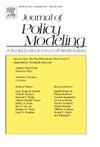Economic and welfare effects of immigration policy: Lessons from the experience of Kuwait
Abstract
Immigration has increasingly caused heated debates in many countries. Political populism has often given rise to anti-immigrant attitude among the public. Immigration policy decisions have often been based on perceptions and attitudes rather than evidences, specifically considerations of net benefits to the host country. The main objective of this study is to quantify economic impacts of immigration policy, focusing on economic and welfare consequences of reducing the size of immigrant labor. This is illustrated by using the case of Kuwait. The authorities have recently decided to reduce the size of immigrant population. This study set out with the aim of measuring consequences of reducing immigrant labor. A multi-sectoral and economy-wide model was utilized. The model was specified appropriately to capture most features of a segmented labor market. Simulation experiments were conducted in scenarios related to the existing policy, the proposed policy of reducing the number of immigrants, and mitigations required to minimize adverse impacts of the immigration policy reform. The focus was on macro-economy, sectoral and welfare and income distribution impacts. The results obtained indicated inevitable adverse economic and welfare impacts on natives unless the reduction in immigrant labor was accompanied with productivity enhancing policies.

 求助内容:
求助内容: 应助结果提醒方式:
应助结果提醒方式:


